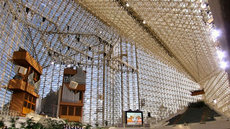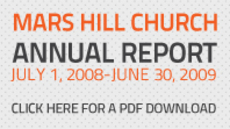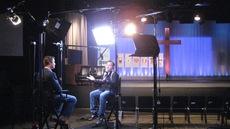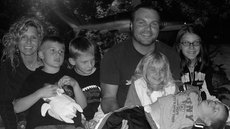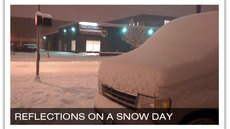Change is the only constant at Mars Hill Church. And we’ve got another change coming as we prepare to go from seven to one hundred campuses in the next decade.
Our first out-of-state campus will be in another time zone (official announcement coming soon), which has precipitated a change in our sermon delivery method. Beginning mid May, we will no longer be live-streaming my Sunday sermons to each of our campuses via our current television satellite infrastructure. Instead, my sermons will be played back on a week delay schedule at every campus except Mars Hill Ballard, where I will continue to preach live.
Here’s how it will work on an average Sunday:
- I will preach all four services on site at the Ballard campus.
- We will choose the best of the four sermons, do any necessary editing, and send it out on Monday to the other campuses for playback the following Sunday.
- The sermon will only be posted online (and podcast) after it has aired at every Mars Hill campus.
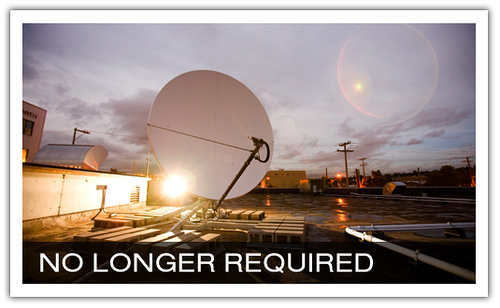
This is a good change for a number of reasons:
1. Campuses get a better sermon—in advance
Since we’ll have four versions of the same sermon to choose from, the video campuses will benefit from getting the best of option, fully edited to correct any technical glitches or misspeaks. Also, they will know exactly where the sermon is going enough days in advance, which will help the leadership prepare their Sunday services and midweek groups to best serve the people who attend the church.
2. Good stewardship
The technology to maintain week delay distribution is much cheaper than our present satellite method. We will save hundreds of thousands of dollars over the course of just a few years. If we achieve our goal of one hundred campuses, it is not a stretch to say that we may actually save over a million dollars.
3. Starting new campuses will be easier
Satellite distribution is a huge barrier to starting more campuses. Not only is the gear expensive and highly technical, but also the content is restricted to a single time zone. Week delay resolves both of these issues.
4. Not everybody has a satellite
Facilities are a difficult barrier to adding new campuses quickly and cheaply. If we continued to use our current satellite technology, it would mean every facility used for a Mars Hill campus would require the permanent installation of satellite gear. However, the week delay playback option allows campuses to meet anywhere a screen and projector can be plugged in. Furthermore, this simple technology makes it very easy for campuses to relocate as needed.
5. It’s hard to miss the “Play” button
The sermon playback process will be simpler and more predictable, reducing the risk of human error and technological failure. This is increasingly important as we add more campuses of varying sizes across the nation and hopefully the world.
6. We can speak more languages
Greater lead-time between sermon capture and distribution will make it easier to translate the sermon into other languages as well as prepare closed captions to help us reach a broader audience.
I want to thank the great guys in the Preaching and Theology branch, under the leadership of Pastor AJ Hamilton, and the Executive Elders of Mars Hill. These great brothers were incredibly helpful as together we thought through and prayerfully researched our various options and, after many months and much prayer, arrived at this crucial decision.
I had considered preaching a midweek service (e.g., a Thursday or Saturday) so as to have an early capture of the sermon for campuses. But in the end, the elders gave me permission to not do that. I have always been opposed to preaching a Saturday night service because that is family day. It’s the only day I take off each week, and the only day I can be home with my children because it’s the only day they do not have school and I do not have work. Although I love Mars Hill Church, I will not sacrifice my family for my ministry.
Furthermore, the problems with a midweek service designed for sermon capture are many, but there are two primary issues. First, the shorter sermon preparation time and one-and-only take means the sermon would not be as good as taking the best of four sermons preached on a Sunday after longer preparation. Second, I travel a great deal and a midweek service would prevent me from traveling as much or serving the greater church in this way.
In conclusion, I doubt our people will care much. The evidence shows that every one of our video campuses has higher membership, higher Community Group participation, and higher financial giving than the Ballard Campus where I preach live. Those people who comprise our video campuses tend to be most devoted to living sacrificially on mission as the church. Those who come to hear me preach in Ballard are a mix of lost people, committed servants, and Christian consumers who need to get on mission.
Since our video campuses are excelling at living missionally by bringing the gospel to neighborhoods around and now beyond Seattle, we are excited to be changing the sermon delivery method in order to allow more campuses to exist as quickly, cheaply, and effectively as possible.
Note: As for the existing satellite-related equipment, we are in the process of selling much of this gear. Some of it we will keep in order to continue hosting live events (such as conferences and guest speakers) in multiple locations.
